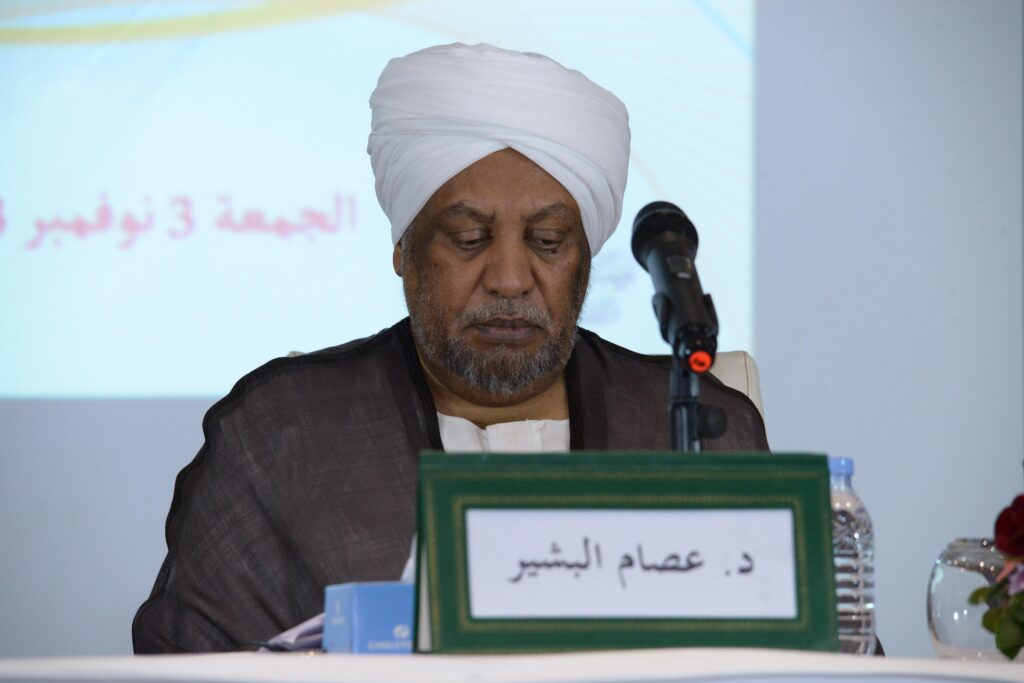Lecture by Dr Issam al-Bashir

Al-Furqān Islamic Heritage Foundation, London, in partnership with Association Espace Cadres, Morocco, organised a lecture by Dr Issam al-Bashir—may God preserve him, titled “Rightly-guided religious observance: concept, characteristics, and hurdles”. The event held at 8:30pm in the Avanti Mohammedia Hotel on Friday, 3 November 2023, was chaired by Dr Wasfi Ashour Abu Zayd. We summarise its key points as follows:
The lecturer began by explaining through deconstruction and analysis the lecture’s terminology, commonly-used in the contemporary knowledge field; for example, the meaning of the term, “dīn”, in both language and the Quranic context. He also addressed the difference between religious observance and religion proper. In the same context, he explored the term, “rushd”, in language and the Quranic context, presenting its meaning according to scholars.
Henceforth, Dr Issam began by elucidating the characteristics of rightly-guided religious observance. He addressed this along six axes, namely: rightly-guided religious observance is in harmony with innate nature (fiṭrah); rightly-guided religious observance builds life; rightly-guided religious observance is one of moderation; and is a positive observance that is constructive, not destructive; it adopts a graded approach that takes account of natural laws and priorities; furthermore, it is an observance that espouses co-existence. He assembled these within an axiomatic framework, as follows: from form and appearance to reality and essence; from words and argument to contribution and action; from emotion and anarchy to the rational and scientific; from branches and minor issues to roots and fundamentals; from severity and repulsiveness to promoting ease and giving good news; from stagnation and blind imitation (taqlīd) to creative juristic effort (ijtihād) and renewal (tajdīd); from fanaticism and self-isolation to tolerance and openness; from extremism and dissolution to moderation and balance; from violence and resentment to tenderness and compassion; from discord and animosity to harmony and solidarity.
The respected lecturer paused to illustrate examples of religious observance straying from the rightly guided. He expanded on this by giving twelve examples, which we summarise as: bogus observance; deficient observance; ‘pick and choose’ observance; absented observance; reversed observance; superficial observance that cares for appearance rather than essence; suicidal observance that begins with “takfīr”, i.e. accusation of apostasy and ends in bombing, as an overwhelmingly extremist observance; contentious religious observance that thrives on disagreement; mesmerised religious observance that lives in thrall to the past, without scrutiny or critical discernment; reclusive religious observance, which is a form of self-absorbed observance where one is satisfied with individual practice in the religion, ignoring its social and collective aspects; and defeatist religious observance, where one retreats into religious observance due to a crisis or difficulty that they experienced.
He concluded his lecture by saying that rightly guided religious observance is one linked to God and moderate, balanced and comprehensive, in harmony with innate nature and a driving force for life. This level of religious observance will raise the Muslim nation’s actuality from the realm of fair existence to the realm of active testimony through creed in harmony with innate nature, ritual worship that drives civilising effort, intellect guided by revelation, knowledge connected to faith, ethics that elevate the human being, body sustained by spirit, family that protects the individual, and legislation that secures the public interest.
Subsequently, the door for discussion was opened. Subsequently, this engaging event closed with beneficial supplications.
All praise is to God, Lord of all creation

